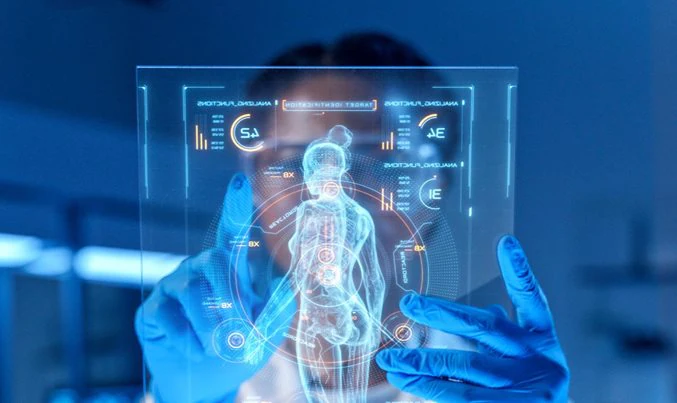Artificial intelligence tools penetrate all spheres of life. The AI market has increased to $184 billion in 2024, compared to $135 billion in 2023. According to analytics, this growth will continue to happen. Healthcare is the domain where AI can speed up workflow and release staff from routine tasks.
The Chief Innovation Officer of the Belitsoft Software Development Company, Dmitry Baraishuk, highlights the necessity of clear and transparent data input before implementing AI tools. In healthcare, business intelligence tools and data analytics use historical data to generate insights and further upload them to machine learning technologies.
AI terminology subtleties
Narrow AI helps to deal with a particular task and cannot go beyond its sphere of competence. For example, it aids radiologists in reading scans and images, recognizing alienations from the norm, and predicting health risks
Generative AI is more agile and can adapt its knowledge to the request. It can deal with administrative procedures, such as filling in clinical records, submitting the data to the EHRs, and processing insurance claims. Generative AI chatbots know how to respond to the most common queries on the site and guide potential customers through marketing funnels. The most well-known example of generative AI today is ChatGPT.
Can we trust ChatGPT with our health issues?
As far as the level of competence is concerned, ChatGPT demonstrates high levels of consistency and discernment in its answers. The researchers made the Chat pass the United States Medical Licencing Exam. The exam consists of three parts. Future doctors take it between their medical school and residency training. The researchers concluded that AI models “have the potential to assist with medical education, and potentially, clinical decision-making”.
Another study compared the answers of real doctors and ChatGPT. Researchers selected 195 questions from random people on the Reddit AskDocs forum. A panel of experts, including associate professors of medicine, agreed that ChatGPT gave better answers than real doctors did in 78% of cases.
However, in more specific medical domains, the performance of ChatGPT is not that encouraging. Out of 125 questions on the Ophthalmic Knowledge Assessment Test, the Chat successfully dealt with 58, which comprises 46%.
The same conclusion can be drawn regarding providing postoperative instructions for some common pediatric otolaryngology procedures. In a study, eight medical conditions were selected, and the review board from Stanford University compared the instructions generated by ChatGPT, Google Search, and the University experts. Humans gave the best instructions in terms of their clarity and efficiency.
As a result, ChatGPT can assist human doctors in dealing with more general and common health issues. For instance, ChatGPT can be used by medical providers to generate answers to patients’ questions on the site. Besides, chatbots can sort the requests, direct more specialized queries to human experts, or offer to schedule an appointment with a doctor.
How does AI enhance medical research?
Diagnosis
AI tools accelerate diagnostics. They analyze and interpret images in radiology, dermatology, dentistry, and other medical domains. For example, doctors use AI tools to read mammograms, control the condition of the fetus, analyze retinal biomarkers, and conduct endoscopic ultrasound. In comparison with traditional methods, AI tools usually analyze the data faster. High-field MRI systems, for instance, provide a full description of the results almost immediately, which saves time for both the patient and the doctor.
There are cases when ChatGPT manages to process the laboratory tests, disease history, and symptoms and generate a relevant diagnosis. Thus, a guy typed his dog’s test results into the Chat and received a diagnosis later confirmed by a vet.
Relying on ChatGPT for medical diagnosis might be too hasty. However, Google is currently working on its Med-PaLM 2, a large language model (LLM) designed specifically for the healthcare domain to assist medical providers in interacting with customers.
Precision medicine
Personalized or precision medicine implies a tailored approach to each patient. Instead of developing a one-size-fits-all treatment plan, doctors consider factors like family history, gender, age, and race. They analyze those factors in combination with symptoms and disease development and provide relevant recommendations. However, it is challenging to conduct such a thorough analysis without additional tools. Here is where AI steps in. It takes the data from EHRs, utilizes data analytics, and suggests treatment plans.
Pharmacology
The development of new drugs takes time. Drug discovery companies like Insilico Medicine use AI in research and development to speed up the process. In 2023, the company introduced a medication for idiopathic pulmonary fibrosis that was completely AI-discovered and designed.
Clinical trials
Bringing new medicines to market takes up to nine years. After such a long period, only 1 out of 10 pills finally enters the market. The reasons behind failed trials include insufficient eligible trial patients, unexpected side effects, confusing data, etc. AI can assist with those issues in the following ways:
- Selecting the right patients for the trials by analyzing the EHRs.
- Accelerating the enrollment process. Finding suitable candidates for the trial is the tip of the iceberg. Patients have to undergo various screens and tests to confirm their eligibility. AI tools can help with interpreting results, filling in the data, and transferring documents to institutions.
- Monitoring the process of the clinical trial by sending notifications to the patients and tracking their health indicators.
Epidemiology
AI algorithms can predict outbreaks of dangerous diseases, saving people’s lives. A scientist from the Dominican Republic has developed software that uses big data to predict dengue fever, a mosquito-borne disease that infects around 390 million people a year. The algorithm uses health, location, climate, and socio-economic data to foresee future infections. 88 out of 100 predictions came true.
Follow-up: staying on the safe side
In medical questions, irrelevant data and recommendations might lead to serious health issues. Therefore, as a developer or a medical provider, you should double-check the data your AI tools use in their learning algorithms. Make sure your technologies comply with regulations such as the upcoming EU AI Act. Do not ask patients to share their personal information in the chat, and disable AI training based on patients’ requests.


